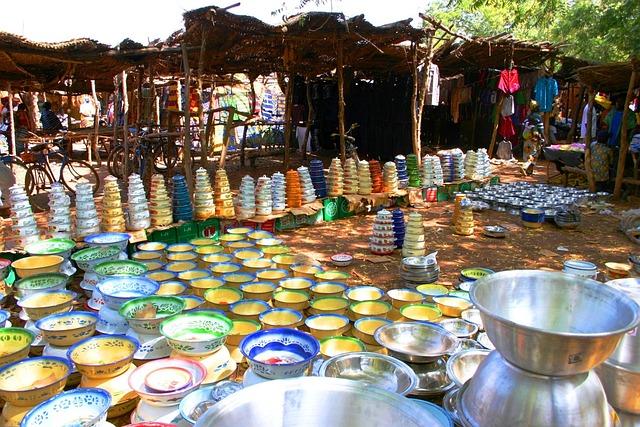In a significant shift in the geopolitical landscape of West Africa, Burkina Faso, Mali, and Niger have officially announced their departure from the economic Community of West African States (ECOWAS), the region’s foremost political and economic bloc. This unprecedented move comes amid mounting tensions and a growing sentiment among the three nations, which have been lead by military governments following a series of coups. As the stability of the Sahel region remains precarious, the implications of this withdrawal are profound, raising questions about the future of regional cooperation, security dynamics, and international relations in a region grappling with rising extremist violence and socio-economic challenges. This article delves into the motivations behind this decision, the immediate reactions from ECOWAS and other stakeholders, and the potential consequences for West Africa’s political landscape.
Burkina Faso, Mali, Niger: The Implications of Their Departure from ECOWAS
The recent decision by Burkina Faso, Mali, and Niger to leave the Economic Community of West African States (ECOWAS) marks a ample shift in West African geopolitics. This departure is set against a backdrop of escalating tensions with neighboring states and a rise in military-led governance within these countries. The implications of this move are multifaceted, influencing economic stability, regional security, and diplomatic relations within the West African region.As these nations diverge from ECOWAS, observers anticipate a greater push towards isolationism, which could exacerbate existing humanitarian and economic challenges.
Furthermore, the exit could create significant ramifications for ECOWAS itself. The departure of these member states could lead to a reconfiguration of alliances and a weakening of collective bargaining power on regional issues such as trade, security, and migration.Potential consequences may include:
- Diminished economic cooperation: The reduced collaboration in trade agreements and developmental projects could hinder economic growth in the region.
- Increased security threats: A vacuum in security cooperation may embolden extremist groups operating in the Sahel region.
- Political fragmentation: This move may inspire other nations facing internal strife to reconsider their affiliations, leading to further instability.
| Impacts | Potential outcomes |
|---|---|
| Economic Fragmentation | Reduction in trade volume and investment. |
| Security Deterioration | Rise in extremist activities and cross-border crime. |
| Political Isolation | Strain relations with international partners. |
Historical Context of Burkina Faso, Mali, and Niger’s Relationship with ECOWAS
The historical ties and dynamics between Burkina Faso, Mali, and niger with the Economic community of West African States (ECOWAS) have been shaped by a myriad of factors, including economic interests, cultural connections, and political governance. Established in 1975, ECOWAS aimed to foster regional integration and stability, a vision that resonated with the three countries faced with numerous challenges, including terrorism, poverty, and political instability. However, their relationship with the bloc has often been tested by differing political agendas, particularly regarding governance and the military’s role in politics.A wave of military coups in recent years has led to tensions with ECOWAS, which advocated for democratic transitions and imposed sanctions on the ruling juntas in these nations.
Moreover,the geopolitical landscape in the Sahel region has dramatically influenced their interactions with ECOWAS. The threat of jihadist terrorism has prompted Burkina faso, Mali, and Niger to seek security collaborations, sometimes at odds with ECOWAS’s approaches, which focus on diplomatic solutions. The growing discontent with perceived external influences and a yearning for sovereignty have spurred these nations to reevaluate their commitments. Key factors contributing to their estrangement from ECOWAS include:
- Military Governance: The rise of military regimes has led to conflicts over ECOWAS’s democratic standards.
- Security concerns: Increasing violence from extremist groups necessitating immediate responses over diplomatic processes.
- Economic Priorities: Frustrations regarding economic policies perceived as unfavorable or ineffective.
Impact on Regional Stability and Security in West Africa
The recent departure of Burkina Faso, Mali, and Niger from the Economic Community of West African States (ECOWAS) marks a significant shift in the geopolitical landscape of West Africa. this move not onyl signals rising nationalism and shifts in political allegiance within the region but also exacerbates existing security challenges. With these nations adopting a more isolationist stance, the structural integrity of regional security frameworks is put to the test.The implications for stability may include:
- Increased Fragmentation: The splintering of collective security arrangements could embolden extremist groups, as coordinated efforts against them become more challenging.
- Power Vacuums: As traditional governance structures are undermined, power vacuums may arise, leading to potential conflicts over resources and control.
- Declining Diplomatic Relations: The severance of ties with ECOWAS could limit diplomatic dialog, hindering international support and interventions during crises.
Moreover, the exit of these nations from ECOWAS could alter the dynamics of regional alliances, complicating external engagement strategies aimed at stabilizing West Africa. The specter of increased militarization looms, with neighboring countries possibly reallocating resources to shore up their borders against the fallout from these nations’ exodus. As regional governments reassess their security postures, potential responses could vary widely and may include:
| Response Strategies | Potential Outcomes |
|---|---|
| increased Military Spending | Heightened regional tensions and arms races. |
| Enhanced Bilateral Security Agreements | Stronger coalitions among remaining ECOWAS members. |
| Increased vigilance Against Extremism | possible deterioration in human rights and civil liberties. |
Economic Consequences for the Exiting nations and the ECOWAS Block
The departure of Burkina Faso, Mali, and Niger from the Economic Community of West african States (ECOWAS) marks a significant economic shift not just for these nations, but also for the bloc as a whole. For the exiting nations, the immediate economic repercussions may include a reduced scope for trade and investment opportunities, as they lose access to the ECOWAS common market which provides preferential tariffs and trade regulations. This could lead to a decline in foreign direct investment, as businesses frequently enough seek stable environments supported by regional agreements.Moreover, challenges like increased isolation and difficulty in accessing essential goods and services may arise, severely impacting the local economies and increasing reliance on external sources.
On the other hand, the ECOWAS bloc is highly likely to experiance its own set of economic challenges. With the exit of these nations, the diversity and stability of the region’s economic landscape could be compromised. Key aspects to consider include:
- Reduced Market Size: The withdrawal of three member states decreases the overall consumer market, which can impact regional production capabilities.
- Trade Imbalances: Neighboring nations may face disruptions in trade flows and supply chains that previously relied on these members.
- Economic Instability: The exit could signal political instability in the region,leading to decreased investor confidence across ECOWAS member states.
| Nations | potential economic Impact |
|---|---|
| Burkina Faso | Decline in trade, increased reliance on imports |
| Mali | Decreased foreign investment |
| Niger | Trade route disruptions |
| ECOWAS | Loss of market share, instability |
Recommendations for Strengthening Regional Cooperation Amidst Departures
To address the growing challenges posed by the departures from the regional political bloc, it becomes crucial to foster mechanisms that promote dialogue and collaboration. Initiatives should focus on establishing multilateral forums where member states can engage in open discussions about common concerns. Additionally, creating joint investment programs could help stabilize economic relations among the remaining nations, while also incentivizing those who have left to reconsider their stance.Key strategies could include:
- enhanced Diplomatic Engagement: Regular summits and communication channels to address grievances and strengthen ties.
- Collaborative Security Efforts: Joint operations and intelligence sharing to counter security threats.
- Shared Economic Goals: Aligning regional policies to stimulate trade and investment.
Moreover, establishing a regional advisory council could serve as a platform for conflict resolution and policy recommendations. This council woudl comprise representatives from both departing and remaining member states, ensuring that all voices are heard, thus fostering a sense of inclusion and cooperation. Implementing these strategies will not only enhance solidarity but also create a stronger foundation to navigate future uncertainties within the West African landscape. The following table outlines potential focus areas for this new cooperative framework:
| Focus Area | Objectives | Expected Outcomes |
|---|---|---|
| Trade agreements | Open markets and reduce tariffs | Boost regional economies |
| Security Collaboration | Enhance collective defense mechanisms | Reduce regional insecurity |
| Cultural Exchange Programs | Promote understanding and unity | Strengthen social ties |
Future Prospects for West African Unity and the Role of External Actors
The detachment of Burkina Faso, Mali, and Niger from the economic Community of West African States (ECOWAS) signifies a critical juncture in the trajectory of regional unity. This move reflects deep-seated tensions and divergent political interests among member states, prompting discussions about the future of collective governance in West Africa. with the rise of military juntas in these nations, there is a clear pivot towards sovereignty over collaboration, which may have long-lasting implications on economic growth and security initiatives across the region. As traditional alliances are tested, every country will need to reevaluate its diplomatic approach while considering the impact of internal stability and regional cooperation.
| Key Factors Influencing Unity | Potential Outcomes |
|---|---|
| Security Threats | Increased vulnerability to extremist groups |
| Economic Sanctions | Stifled economic growth and development |
| diplomatic Isolation | Reduced international support |
Moreover, the role of external actors such as the African Union, the United Nations, and international powers will be pivotal in shaping the landscape of West African unity. These entities have the potential to mediate conflicts, support transitional governments, and assist regional integration efforts.The responses from these external players could either exacerbate tensions or foster cooperation, depending on how they navigate alliances and interventions. In this evolving context, a balanced approach that respects sovereignty while promoting collaborative solutions will be essential to stabilize the region and provide a pathway towards renewed unity.
In Conclusion
the departure of Burkina Faso, Mali, and Niger from the Economic Community of West African States (ECOWAS) marks a significant shift in the regional political landscape. This move, rooted in a complex interplay of security concerns, national sovereignty, and political dissatisfaction, underscores the ongoing struggles these nations face in addressing issues such as terrorism and economic instability. As ECOWAS grapples with its diminishing influence and the potential repercussions of this exodus, the broader implications for regional cooperation and stability remain uncertain. The decision reflects a growing desire for autonomy among these states, and the coming months will be crucial in determining how these developments will reshape relations within West Africa and alter the dynamics of regional governance. Stakeholders will undoubtedly be watching closely as the situation evolves, as it holds critical implications for the future of peace and cooperation in the region.

